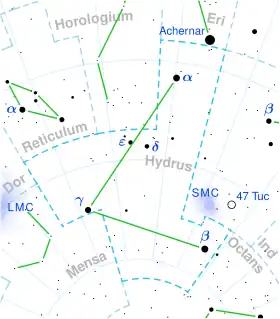Delta Hydri
Delta Hydri, Latinized from δ Hydri, is a single,[7] white-hued star in the southern constellation of Hydrus. It is bright enough to be faintly visible to the naked eye with an apparent visual magnitude of 4.09.[2] The distance to this star, based upon an annual parallax shift of 23.35 mas,[1] is about 140 light years. It is moving away from the Sun with a radial velocity of +6 km/s.[4]
 | |
| Observation data Epoch J2000 Equinox J2000 | |
|---|---|
| Constellation | Hydrus |
| Right ascension | 02h 21m 44.94286s[1] |
| Declination | −68° 39′ 33.9038″[1] |
| Apparent magnitude (V) | 4.09[2] |
| Characteristics | |
| Spectral type | A2 V[3] |
| U−B color index | +0.05[2] |
| B−V color index | +0.03[2] |
| Astrometry | |
| Radial velocity (Rv) | +6.00[4] km/s |
| Proper motion (μ) | RA: -49.95[1] mas/yr Dec.: +2.48[1] mas/yr |
| Parallax (π) | 23.35 ± 0.34 mas[1] |
| Distance | 140 ± 2 ly (42.8 ± 0.6 pc) |
| Absolute magnitude (MV) | 0.92[3] |
| Details | |
| Mass | 2.25[5] M☉ |
| Radius | 2.3[5] R☉ |
| Luminosity | 39.52[3] L☉ |
| Surface gravity (log g) | 3.98[6] cgs |
| Temperature | 9,880±336[6] K |
| Metallicity [Fe/H] | +0.12[3] dex |
| Rotational velocity (v sin i) | 162[6] km/s |
| Age | 209[6] Myr |
| Other designations | |
| Database references | |
| SIMBAD | data |
This is an ordinary A-type main-sequence star with a stellar classification of A2 V[3] It is about 209 million years old and has a high rate of spin, showing a projected rotational velocity of 162 km/s.[6] This is giving the star an oblate shape with an equatorial bulge that is 7% larger than the polar radius.[8] The star has 2.25 times the mass of the Sun and 2.3 times the Sun's radius.[5] It is radiating 39.5[3] times the Sun's luminosity from its photosphere at an effective temperature of around 9.880.[6] Delta Hydri has been checked for an infrared excess, but none was found.[7]
References
- Van Leeuwen, F. (2007). "Validation of the new Hipparcos reduction". Astronomy and Astrophysics. 474 (2): 653–664. arXiv:0708.1752. Bibcode:2007A&A...474..653V. doi:10.1051/0004-6361:20078357. S2CID 18759600. Vizier catalog entry
- Ducati, J. R. (2002). "VizieR Online Data Catalog: Catalogue of Stellar Photometry in Johnson's 11-color system". CDS/ADC Collection of Electronic Catalogues. 2237. Bibcode:2002yCat.2237....0D.
- Anderson, E.; Francis, Ch. (2012). "XHIP: An extended hipparcos compilation". Astronomy Letters. 38 (5): 331. arXiv:1108.4971. Bibcode:2012AstL...38..331A. doi:10.1134/S1063773712050015. S2CID 119257644. Vizier catalog entry
- Kharchenko, N.V.; Scholz, R.-D.; Piskunov, A.E.; Röser, S.; Schilbach, E. (2007). "Astrophysical supplements to the ASCC-2.5: Ia. Radial velocities of ~55000 stars and mean radial velocities of 516 Galactic open clusters and associations". Astronomische Nachrichten. 328 (9): 889. arXiv:0705.0878. Bibcode:2007AN....328..889K. doi:10.1002/asna.200710776. S2CID 119323941.
- Allende Prieto, C.; Lambert, D. L. (1999). "Fundamental parameters of nearby stars from the comparison with evolutionary calculations: Masses, radii and effective temperatures". Astronomy and Astrophysics. 352: 555–562. arXiv:astro-ph/9911002. Bibcode:1999A&A...352..555A. Vizier catalog entry
- David, Trevor J.; Hillenbrand, Lynne A. (2015). "The Ages of Early-Type Stars: Strömgren Photometric Methods Calibrated, Validated, Tested, and Applied to Hosts and Prospective Hosts of Directly Imaged Exoplanets". The Astrophysical Journal. 804 (2): 146. arXiv:1501.03154. Bibcode:2015ApJ...804..146D. doi:10.1088/0004-637X/804/2/146. S2CID 33401607. Vizier catalog entry
- Rodriguez, David R.; et al. (May 2015), "Stellar multiplicity and debris discs: an unbiased sample", Monthly Notices of the Royal Astronomical Society, 449 (3): 3160–3170, arXiv:1503.01320, Bibcode:2015MNRAS.449.3160R, doi:10.1093/mnras/stv483, S2CID 119237891.
- van Belle, Gerard T. (March 2012), "Interferometric observations of rapidly rotating stars", The Astronomy and Astrophysics Review, 20 (1): 51, arXiv:1204.2572, Bibcode:2012A&ARv..20...51V, doi:10.1007/s00159-012-0051-2, S2CID 119273474.